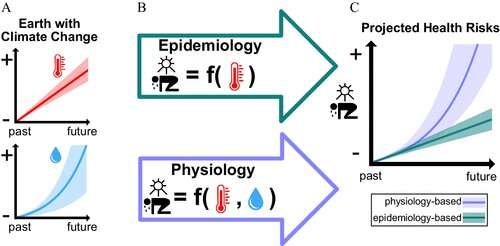This article has been reviewed according to Science X's editorial process and policies. Editors have highlighted the following attributes while ensuring the content's credibility:
fact-checked
peer-reviewed publication
trusted source
proofread
Study: Under climate change, moist heat stress is expected to worsen public health outcomes

As climate change increases the severity, frequency and duration of heat waves around the world, researchers at the University of California, Irvine and other institutions are sounding an alarm about what they consider to be an added threat to human health: humidity.
Heat extremes increase the risk of illness and death, with the worst outcomes among people who are older, have chronic diseases, live in hot climates and are socioeconomically disadvantaged. In addition, humidity causes heat stress by making it harder for bodies to cool, but medical and public health experts still disagree about the extent of its health and mortality impacts.
In a paper published today in the journal Environmental Health Perspectives, the UCI-led team—which included researchers in epidemiology, physiology, biometeorology, public health and climate science—highlights a dispute between physiologists who view humidity as a critical driver of heat stress and epidemiologists who minimize its role in thermal health outcomes.
"It's important that we resolve these divergent views on the impact of humidity in heat-related health risks," said lead author Jane Baldwin, UCI assistant professor of Earth system science. "Without a strong agreement about humidity's role in heat stress, we will not be able to confidently predict future health impacts from extreme heat, expected to worsen with climate change. We'll also struggle to optimize interventions to reduce the effects of extreme heat."
According to the paper, epidemiological studies tend to produce little evidence of an impact from humidity on heat-health outcomes, which could stem from a variety of reasons. For some causes of death often exacerbated in the heat, such as cardiovascular illness, humidity may be less important than for classic heat stroke. Epidemiological data sets are biased toward higher-income nations in cooler, drier climates outside the tropics, the authors argue. Many studies focus on older populations, in which sweating impairments are prevalent.
"We hypothesize that epidemiological studies often do not have the spatial scope and resolution necessary to answer all of the questions about the relationship among heat, humidity and poor health outcomes," Baldwin said. "We feel it's necessary to question these assumptions to derive more accurate models under present and future climate conditions."
The paper's authors cite a 2010 study concluding that a "wet bulb" temperature exceeding 35 degrees Celsius (95 Fahrenheit) is not survivable for humans past roughly six hours. Wet bulb measurements are taken with a thermometer draped in a damp cloth; they are a way of gauging both heat and humidity extremes. When the air temperature is above 35 degrees C, evaporation of perspiration is frequently the only avenue for bodily heat dissipation. As humidity rises, sweating efficiency declines, making it difficult or impossible for bodies to cool off, increasing the risk of heat exhaustion and heat stroke, according to the paper.
The Environmental Health Perspectives paper addresses the environmental justice aspects of the argument multiple times. Prolonged heat waves with high humidity in tropical nations of Africa, Central America, South America and Asia often have the worst impact on low- and middle-income populations, people who can't afford air conditioning or a means of escape.
Heat waves have caused widespread suffering in recent years. Over the course of a month in 2015, 1,220 residents of Karachi, Pakistan, died from heatstroke. In Japan in 2018, nearly 35,000 people needed emergency transports for heat-related issues. High temperatures killed more than 600 residents of British Columbia, Canada, in less than a week in 2021. Scientists claim that about 37 percent of heat-related deaths over the past few decades can be attributed to climate change.
"As we get further into the anthropogenic climate change era, we can expect to see an increasing portion of the population subject to these heat and humidity extremes, posing substantial risks to human life and well-being," Baldwin said.
She said that future epidemiological studies of moist heat stress may benefit from a rethinking of the placement of measuring instruments. Currently, temperature is taken on the outskirts of towns, at airports and other facilities. A more accurate assessment may be obtained through readings taken in dense urban zones, Baldwin notes. This would help scientists take into account the "heat island" effect, which happens when the sun's radiation is absorbed by roads and other dark and dry surfaces.
"We also suggest that epidemiological studies contain more data from lower- and middle-income countries, which are often situated in hot and humid tropics," she said. "And we urge physiologists and medical doctors to come up with ways to better characterize the mechanisms and time scales of death during heat waves and the compounding impact of humidity."
More information: Humidity's Role in Heat-Related Health Outcomes: A Heated Debate, Environmental Health Perspectives (2023). DOI: 10.1289/EHP11807. ehp.niehs.nih.gov/doi/10.1289/EHP11807





















